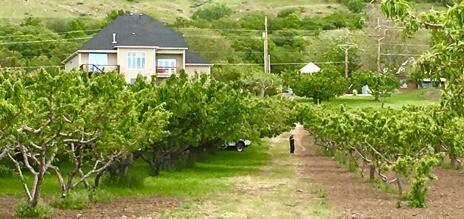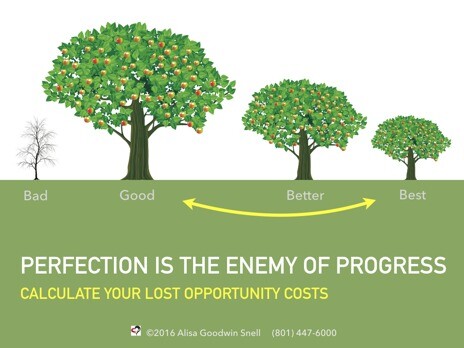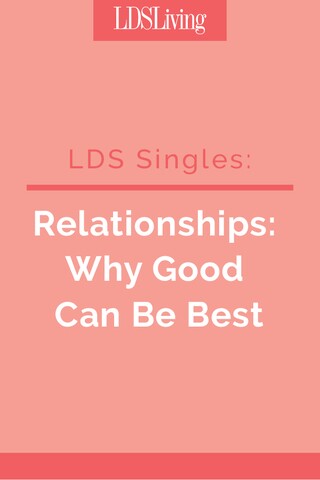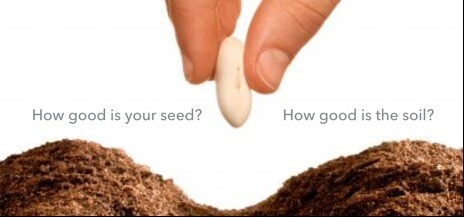Most LDS singles strive to be their best in every aspect of life. They fear settling for something that is mediocre in dating and love. They hope for amazing (and even enviable) relationships.
Unfortunately, this tendency to want more than what is good, but that which is better or best, in a partner can lead many singles to abandon potentially good relationships before they’ve had a chance to grew and bear fruit.
As a dating and relationship coach, I frequently help singles evaluate the wisdom of staying in or leaving their relationships. To do this I often use the analogy of an orchard. Singles represent the seed and their dating partners represent the soil. Alone, the seed and soil are fruitless but together, they have the potential for amazing growth.
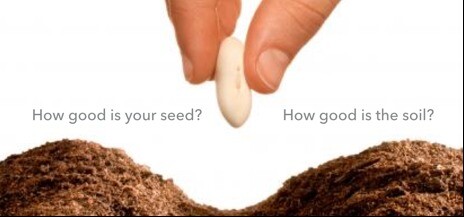
To help singles determine if they are in a “bad” relationship, I ask them to assess if they or their partner lack empathy, self-control, and personal responsibility. If this is the case their relationship (or tree) will ultimately fail; thus, the decision to leave makes the most sense.
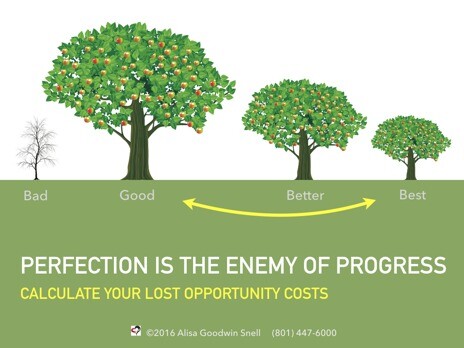
But what should a man or woman do when their partner is good, albeit with normal flaws and issues? Isn’t it possible that with time they could find someone better? What harm is there in searching for the best before settling down? Won’t something that is better or best produce superior results (or fruit) than that which is just good?
Such questions are normal but inherently flawed for several reasons. When seeking a partner, if “the best” means perfection within their partner or relationship they need to remember: First, “the best” does not exist within any individual, second, “better” is usually a trap, and third, “good” is often the best path to progression.
The best does not exist.
Spencer W. Kimball stated in a BYU Devotional on December 5, 1955 that challenges and imperfections are part of God’s plan. He said:
"If all the sick were healed, if all the righteous were protected and the wicked destroyed, the whole program of the Father would be annulled, and the basic principle of the gospel, free agency, would be ended.
"If pain and sorrow and total punishment immediately followed the doing of evil, no soul would repeat a misdeed. If joy and peace and rewards were instantaneously given the doer of good, there could be no evil—all would do go, and not because of the rightness of doing good. There would be no test of strength, no development of character, no growth of powers, no free agency, no satanic controls.
"Should all prayers be immediately answered according to our selfish desires and our limited understanding, then there would be little or no suffering, sorrow, disappointment, or even death, and if these were not, there would be an absence of joy, success, resurrection, eternal life and godhood."
For these reasons and many others, seeking “the best” partner perpetuates the illusion that relationships should be free of struggle and anxiety and are only right when they’re easy and exceptional. But, as this quote illustrates, if we were able to obtain such idyllic relationships, it would hurt us more than it would help us. It would impede our growth and make us lazy or weak. God has more in store for us than that. God gives us issues so that we might become strong through Him (Ether 12:27). When we abandon relationships in hope of finding “the best,” it causes us to lose much more than we know. In this way, perfection becomes the enemy of our progression.
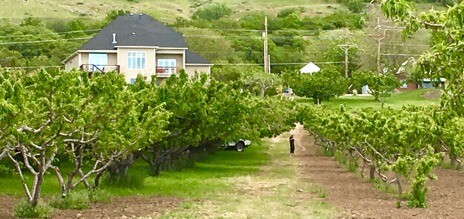
Better is a trap.
So what about the pursuit of someone who is “better”? Aren’t there some people who are more ideally suited for each other than others?
These are difficult questions. The problem is that determining if someone is better often keeps singles caught in an exhausting pattern of comparison. This trap usually causes them to feel doubt and dissatisfaction both personally and within their relationships.
The only way to escape this comparison trap is for singles to create their own standard of what is good or better for them.
Good is the best.
The decision to stay or leave then becomes one of assessing the good that would be gained if they choose to grow where they’re planted. Like a gardener seeking a good place to grow his orchard, he need not search endlessly for the best land. In fact, that could waste his time and lessen the amount of fruit he could yield. He need only find land with good soil. He can then, with his partner, commence laboring in the field to enrich the soil, nourish the seed, prune the trees, protect the vulnerable fruit, and enjoy their harvest. In time they discover that the exceptional condition of their fruit depended less on whether they were individually good, better, or best, and more on how much they were willing to labor, love, and nurture their orchard. It is the diligence and care of the laborers that makes them useful in the kingdom of God.
The Lord does not care as much about who we marry as He cares about who we’ll become because of how we treat our marriages and families. In this way, marriage is God’s university for making us more like Him.
Thus, we do not need to be or date the best. We only need to be good people who are willing to labor, love, and laugh as we nurture our relationship with our partner and God. When we do this, we achieve the best together.
Alisa Goodwin Snell spent 17 years as a marriage and family therapist before becoming a dating and relationship coach. She’s written several books for singles, been on over 100 TV and radio programs nationwide, and is a sought out public speaker. To learn more visit, www.LastingLoveAcademy.com.
Images provided by Alisa Goodwin Snell.

